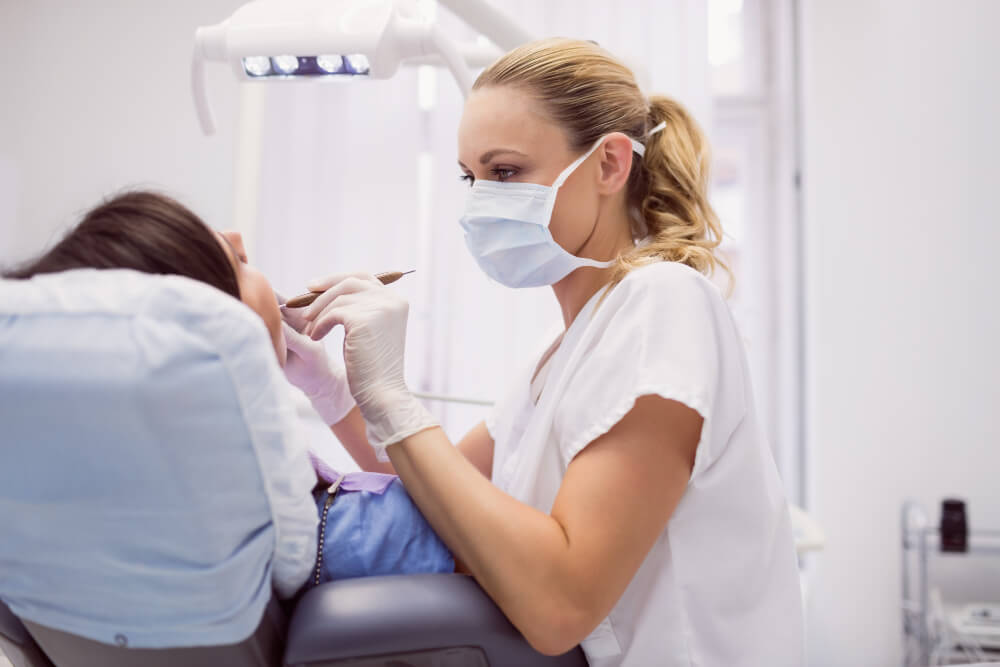Dental treatments not recommended during pregnancy (what to expect)
- Orthodontics (start of treatment with brackets or aligners)
- Dental implants
- Non-urgent oral surgery (e.g., wisdom tooth extraction without infection)
- Tooth whitening
- Dental esthetics (veneers, dental remodeling for esthetics)
- lengthy or complex procedures that may cause unnecessary stress or discomfort
Important: In case of pain, infection or urgency, the treatment must be done without delay, adapting the techniques and materials for the safety of the pregnant woman.
X-rays
Although digital dental radiographs with a leaded apron have a minimal dose, they are avoided in pregnancy if they are not essential (except in emergencies).
Endodontics
Endodontics is a safe treatment in pregnancy when indicated.
An untreated dental infection can be much more dangerous to mother and baby than the treatment itself. The priority is always to eliminate the source of infection and pain.
Anesthesia and general sedation
Conscious sedation or general anesthesia is avoided, except when strictly necessary for emergency reasons and under medical supervision.
Treatments that can be performed without risk
- Professional dental cleanings and prophylaxis
- Caries treatment (fillings)
- Extractions due to infection or urgency
- Gum treatments (if gingivitis or periodontitis is present)
The second trimester is recommended as the ideal time for the necessary treatments because it is the safest and most comfortable period for both mother and baby.
Myths about the dentist and pregnancy
Pregnancy is a time when many doubts arise about what is safe and what is not. Among them, dental care generates concern, and it is not uncommon to hear claims that, although widespread, are not true. In this article we debunk some of the most common myths about the dentist and pregnancy, so that you know how to take care of your oral health without unnecessary fears.
❌ Myth 1: “No dental treatments during pregnancy”
👉 Reality: Most basic treatments are perfectly safe during pregnancy, especially in the second trimester. Fillings, cleanings, necessary extractions or gum treatments can not only be performed, but are often recommended to avoid complications.
❌ Myth 2: “Dental X-rays are forbidden.”
👉 Reality: While it is true that x-rays are not routinely performed, in case of emergency or diagnostic need, they can be done without a problem. Today’s digital X-rays emit very little radiation and protections such as an apron and lead collar are used for safety.
❌ Myth 3: “The baby gets calcium from the mother’s teeth, that’s why they break down”
👉 Reality: The baby gets the calcium it needs from the mother’s food, not from her teeth. Dental problems in pregnancy are often related to hormonal changes (which affect the gums), nausea, vomiting or increased snacking.
❌ Myth 4: “You can’t use local anesthesia during pregnancy”
👉 Reality: Local anesthesia is safe during pregnancy when applied by a professional who knows the proper dosages. In many cases it is necessary to be able to perform treatments painlessly and safely.
❌ Myth 5: “It’s better to wait until delivery to treat dental problems.”
👉 Reality: Delaying necessary treatment can be harmful. Untreated dental infections, for example, can pose a risk to mother and baby. The important thing is to plan treatments and perform them at the most appropriate time.
What should you keep in mind?
The second trimester is the ideal period to perform the necessary treatments.
Go for check-ups during pregnancy to avoid complications.
Don’t let discomfort or infections pass you by: taking care of your oral health also protects your baby.


